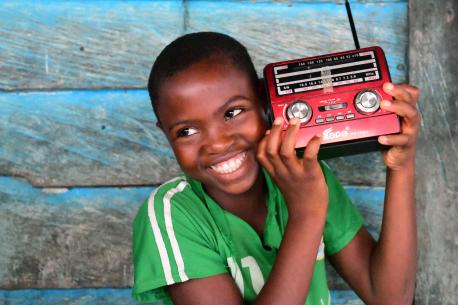
Reckoning With the Learning Crisis During the COVID-19 Pandemic
UNICEF USA applauds the re-introduction of the Global Learning Loss Assessment Act.
Update: The Global Learning Loss Assessment Act (H.R.1500 / S.552) was reintroduced into Congress on March 2, 2021. This new version includes reporting on opportunities for USAID to help expand access to digital infrastructure and internet connectivity, a UNICEF global priority.
In late August, UNICEF reported the startling statistic that at least one third of the world’s schoolchildren are unable to access remote learning during school closures. As many as 463 million children and young people lack access to the internet, computers or other mobile devices to participate in distance learning. In Africa, nearly half of children lack access to remote learning; those in rural environments and from the poorest households are most likely to miss out during school closures.
Education lifts children and families out of poverty
Education can open doors, lifting children and families out of poverty. According to the Global Education Monitoring Report, one extra year of schooling increases an individual's earnings by up to 10 percent. Education also helps to create more peaceful societies and healthier children; studies have shown that additional schooling of mothers corresponds to reductions of infant mortality and higher rates of childhood immunization. Education saves lives.
Before the pandemic, the world was facing a learning crisis — in terms of both access to, and the quality of, education for every child," says UNICEF Executive Director Henrietta Fore. "If we don’t take action now, this crisis will only deepen.
Yet when the COVID-19 pandemic struck, 1.6 billion students were affected by school closures. The longer those students remain out of school, the less likely it is that they’ll ever return. During a recent press conference, UNICEF Executive Director Henrietta Fore urged public health authorities to consider the consequences of school closures on children, “Before the pandemic, the world was facing a learning crisis — in terms of both access to, and the quality of, education for every child. If we don’t take action now, this crisis will only deepen.”
UNICEF USA urges the U.S. Congress to prioritize funding for global basic education
To address this crisis in education, U.S. Senators Ben Cardin (D-MD) and John Boozman (R-AR) and Representatives Chrissy Houlahan (D-PA), Mike Quigley (D-IL) and Brian Fitzpatrick (R-PA) have introduced The Global Learning Loss Assessment Act. The bipartisan bill asks the U.S. government to assess the magnitude of global learning loss that will result from protracted school closures, identifying both the gaps and opportunities in distance learning interventions. The bill would require specific reporting on gaps in reaching marginalized populations, such as girls, children with disabilities and children affected by conflict and crisis.
UNICEF USA is proud to endorse this legislation and urge the U.S. Congress to prioritize funding for global basic education in its FY22 appropriations bill as well as in future COVID-19 supplemental relief packages.
Top photo: Keren, a 12-year-old girl, is listening to a radio education program, in the community of Idinau, in southwest Cameroon. © UNICEF/UN0419385/Dejongh
HOW TO HELP
There are many ways to make a difference
War, famine, poverty, natural disasters — threats to the world's children keep coming. But UNICEF won't stop working to keep children healthy and safe.
UNICEF works in over 190 countries and territories — more places than any other children's organization. UNICEF has the world's largest humanitarian warehouse and, when disaster strikes, can get supplies almost anywhere within 72 hours. Constantly innovating, always advocating for a better world for children, UNICEF works to ensure that every child can grow up healthy, educated, protected and respected.
Would you like to help give all children the opportunity to reach their full potential? There are many ways to get involved.



